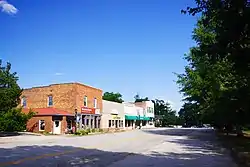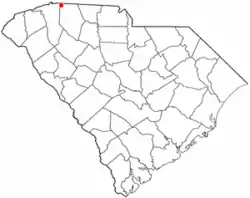Landrum, South Carolina | |
|---|---|
 Trade Avenue (S-562) | |
 Location of Landrum, South Carolina | |
| Coordinates: 35°10′31″N 82°11′10″W / 35.17528°N 82.18611°W | |
| Country | United States |
| State | South Carolina |
| County | Spartanburg |
| Area | |
| • Total | 2.65 sq mi (6.87 km2) |
| • Land | 2.65 sq mi (6.85 km2) |
| • Water | 0.01 sq mi (0.02 km2) |
| Elevation | 1,047 ft (319 m) |
| Population | |
| • Total | 2,481 |
| • Density | 938.00/sq mi (362.11/km2) |
| Time zone | UTC-5 (Eastern (EST)) |
| • Summer (DST) | UTC-4 (EDT) |
| ZIP code | 29356 |
| Area code | 864 |
| FIPS code | 45-40075[4] |
| GNIS feature ID | 1246289[2] |
| Website | http://cityoflandrumsc.com |
Landrum is a city in Spartanburg County, South Carolina, United States. The population was 2,376 at the 2010 census.[5]
Landrum was founded in 1880 and incorporated in 1912. It is located just west of Interstate 26 between Spartanburg and Asheville, North Carolina.[6]
History
The Landrum area was settled circa 1760 by homesteaders from Pennsylvania, Maryland and Virginia. There, they built a fort approximately two miles from the current City of Landrum. The town of Landrum was founded in 1880 after the railroad was extended north from Spartanburg and named after John Gill Landrum, who gave the land for construction of the local depot. Landrum was incorporated as a town three years later. In 1973, it was made into a city.[7]
Geography
Landrum is located at 35°10′31″N 82°11′10″W / 35.17528°N 82.18611°W (35.175326, -82.186036).[8] The city is concentrated around the intersection of U.S. Route 176 and South Carolina Highway 14, just south of the North Carolina-South Carolina border.
According to the United States Census Bureau, the city has a total area of 2.3 square miles (6.0 km2), of which 0.43% is water.
Demographics
| Census | Pop. | Note | %± |
|---|---|---|---|
| 1890 | 155 | — | |
| 1900 | 263 | 69.7% | |
| 1910 | 449 | 70.7% | |
| 1920 | 980 | 118.3% | |
| 1930 | 1,212 | 23.7% | |
| 1940 | 1,289 | 6.4% | |
| 1950 | 1,333 | 3.4% | |
| 1960 | 1,930 | 44.8% | |
| 1970 | 1,859 | −3.7% | |
| 1980 | 2,141 | 15.2% | |
| 1990 | 2,347 | 9.6% | |
| 2000 | 2,472 | 5.3% | |
| 2010 | 2,376 | −3.9% | |
| 2020 | 2,481 | 4.4% | |
| U.S. Decennial Census[9][3] | |||
2020 census
| Race | Num. | Perc. |
|---|---|---|
| White (non-Hispanic) | 2,049 | 82.59% |
| Black or African American (non-Hispanic) | 225 | 9.07% |
| Native American | 1 | 0.04% |
| Asian | 11 | 0.44% |
| Other/Mixed | 92 | 3.71% |
| Hispanic or Latino | 103 | 4.15% |
As of the 2020 United States census, there were 2,481 people, 1,125 households, and 632 families residing in the city.
2000 census
As of the census[4] of 2000, there were 2,472 people, 1,040 households, and 691 families residing in the city. The population density was 1,053.7 inhabitants per square mile (406.8/km2). There were 1,107 housing units at an average density of 471.9 per square mile (182.2/km2). The racial makeup of the city was 81.84% White, 15.86% African American, 0.08% Native American, 0.53% Asian, 0.81% from other races, and 0.89% from two or more races. Hispanic or Latino of any race were 1.78% of the population.
There were 1,040 households, out of which 28.6% had children under the age of 18 living with them, 47.1% were married couples living together, 14.8% had a female householder with no husband present, and 33.5% were non-families. 30.2% of all households were made up of individuals, and 14.5% had someone living alone who was 65 years of age or older. The average household size was 2.36 and the average family size was 2.93.
In the city, the population was spread out, with 23.7% under the age of 18, 7.2% from 18 to 24, 27.3% from 25 to 44, 23.4% from 45 to 64, and 18.5% who were 65 years of age or older. The median age was 39 years. For every 100 females, there were 91.8 males. For every 100 females age 18 and over, there were 85.9 males.
The median income for a household in the city was $29,583, and the median income for a family was $40,347. Males had a median income of $28,375 versus $20,784 for females. The per capita income for the city was $14,259. About 10.4% of families and 15.0% of the population were below the poverty line, including 17.7% of those under age 18 and 18.9% of those age 65 or over.
Education
Public Schools include O.P. Earle Elementary,[11] serving grades PK–5, Landrum Middle,[12] serving grades 5–8, and Landrum High,[13] serving grades 9–12.
Grace Christian School, which serves grades PK–12, is a private institution.
Landrum has a lending library, a branch of the Spartanburg County Public Library.[14]
References
- ↑ "ArcGIS REST Services Directory". United States Census Bureau. Retrieved October 15, 2022.
- 1 2 U.S. Geological Survey Geographic Names Information System: Landrum, South Carolina
- 1 2 "Census Population API". United States Census Bureau. Retrieved October 15, 2022.
- 1 2 "U.S. Census website". United States Census Bureau. Retrieved January 31, 2008.
- ↑ "Race, Hispanic or Latino, Age, and Housing Occupancy: 2010 Census Redistricting Data (Public Law 94-171) Summary File (QT-PL), Landrum city, South Carolina". United States Census Bureau. Retrieved August 15, 2011.
- ↑ http://www.cityoflandrum.com/about/index.php Archived 2013-08-06 at the Wayback Machine - Accessed July 11, 2013
- ↑ http://www.cityoflandrum.com/about/birth.php Archived 2013-12-20 at the Wayback Machine - Accessed July 11, 2013
- ↑ "US Gazetteer files: 2010, 2000, and 1990". United States Census Bureau. February 12, 2011. Retrieved April 23, 2011.
- ↑ "Census of Population and Housing". Census.gov. Retrieved June 4, 2015.
- ↑ "Explore Census Data". data.census.gov. Retrieved December 10, 2021.
- ↑ "O.P. Earle Elementary". Spartanburg County School District One. Retrieved September 1, 2016.
- ↑ "Landrum Middle". Spartanburg County School District One. Retrieved September 1, 2016.
- ↑ "Landrum High School". Spartanburg County School District One. Retrieved September 1, 2016.
- ↑ "South Carolina libraries and archives". SCIWAY. Retrieved June 13, 2019.
